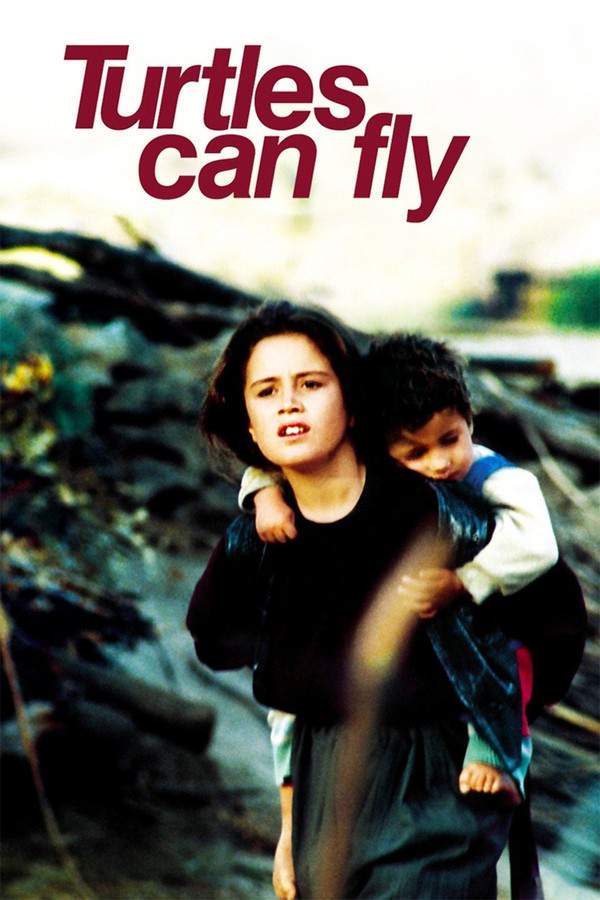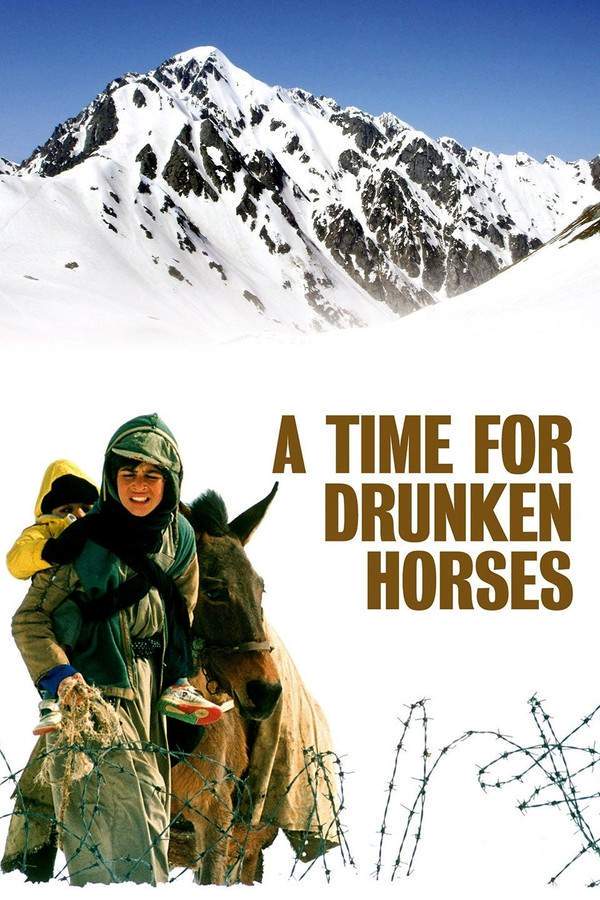
Turtles Can Fly 2005
Directed by

Bahman Ghobadi
Made by

IFC Films
Test your knowledge of Turtles Can Fly with our quiz!
Turtles Can Fly Plot Summary
Read the complete plot summary and ending explained for Turtles Can Fly (2005). From turning points to emotional moments, uncover what really happened and why it matters.
The story unfolds in a Kurdish refugee camp located on the Iraq–Turkey border, just before the US invasion of Iraq. At the heart of the narrative is a thirteen-year-old boy, Soran Ebrahim, who is affectionately called Kak Satellite. Known for his skill in installing satellite dishes and antennas for local villages eager for updates about Saddam Hussein, Kak Satellite’s limited grasp of the English language stems from his interactions with the American forces during their invasion. He stands out as a dynamic yet manipulative leader among the children, orchestrating the perilous task of sweeping and clearing minefields. Despite many of these youngsters suffering various injuries, they maintain a spirited chatter as they devote themselves to their work amidst their challenging lives.
Kak Satellite is not just a leader; he is resourceful in trading undetonated mines. His feelings deepen for Agrin, a girl from Halabja who has recently joined the camp and is confronting her own demons. Agrin, often somber and lost in her thoughts, travels with her disabled brother Hengov, who bears the burden of his clairvoyant abilities that have marred his reputation. They care for a blind toddler named Riga, whom they consider their “little brother.” The backstory of Agrin is harrowing; she gave birth to Riga following a tragic incident with Ba’ath soldiers, which involved gang rape and violent attempts to drown her and her brother. Unfortunately, Agrin perpetually sees Riga as a reminder of her trauma, unable to view him without feeling tainted by her brutal past.
In her desperate struggle, Agrin attempts to abandon the child and even contemplates suicide on several occasions, including a failed attempt to burn herself in a nearby lake. Her anguish leads her to tie Riga to a tree to rid herself of the burden. However, the situation worsens when he wanders into a minefield. During a harrowing rescue attempt, Kak Satellite is injured by an explosive. After numerous desperate tries, Agrin ties Riga to a rock and tragically throws him into the lake before choosing to end her own life by jumping off a cliff.
In a heartbreaking twist, Hengov perceives a vision of their loved ones in peril and rushes out of their tent, only to arrive too late to save them. He ultimately discovers his nephew’s body at the lake’s bottom but is powerless to free him due to his disability. In a moment of deep sorrow, Hengov mourns on the cliff where Agrin made her fateful jump. Meanwhile, a severely injured Kak Satellite watches as the American soldiers pass by, their earlier charm and hope has vanished, leaving him disillusioned by the intervention.
Turtles Can Fly Timeline
Follow the complete movie timeline of Turtles Can Fly (2005) with every major event in chronological order. Great for understanding complex plots and story progression.
Setting the Scene
The story begins in a Kurdish refugee camp located on the Iraq–Turkey border, a place bustling with life just before the US invasion of Iraq. This backdrop highlights the tension and uncertainty facing the refugees as they navigate their precarious existence.
Introduction of Kak Satellite
Thirteen-year-old Soran Ebrahim is introduced as Kak Satellite, a nickname earned for his skills in installing satellite dishes. He becomes a central figure in the camp, eagerly connecting local villages to news updates about Saddam Hussein.
Kak Satellite's Leadership
Kak Satellite emerges as a dynamic yet manipulative leader among the local children. His leadership is showcased in their dangerous task of sweeping and clearing minefields, where they remain remarkably spirited amidst the risks.
Introduction of Agrin
Agrin, a girl from Halabja, arrives at the camp and captures Kak Satellite's attention. Her presence brings both hope and emotional turmoil as she grapples with her trauma and responsibilities for her disabled brother, Hengov.
Hengov's Burden
Hengov, Agrin's disabled brother, struggles with his clairvoyant abilities that have caused shame and hardship. Their family life is further complicated by the care of a blind toddler named Riga, whom they consider family despite the painful memories he represents.
Agrin's Past Trauma
Agrin's backstory reveals a haunting past involving a violent encounter with Ba'ath soldiers, resulting in the birth of Riga. This trauma continues to overshadow her existence, as she battles feelings of anger and guilt towards the child.
Agrin's Struggle with Maternal Instincts
In her desperation, Agrin contemplates abandoning Riga and considers taking her life as a means of escape. Her mental state deteriorates further when she attempts to drown herself in a nearby lake, highlighting her emotional turmoil.
Riga's Dangerous Wander
While tied to a tree to alleviate her burden, Riga wanders into a minefield, setting the stage for a dramatic rescue. Kak Satellite bravely ventures to save him but is injured by an explosive during the chaotic attempt.
Agrin's Desperate Act
In a tragic turn of events, Agrin ties Riga to a rock and throws him into the lake as a final act of despair. She then chooses to leap off a cliff, believing it to be the only way to escape her pain.
Hengov's Grief
After perceiving a foreboding vision, Hengov rushes from their tent only to find too late that both Agrin and Riga are gone. His disability renders him unable to retrieve his nephew's body from the lake, deepening his grief.
Hengov's Lament
Hengov mourns on the cliff's edge, where Agrin ended her life. This moment captures the power of unresolved trauma and the weight of familial connections as he grapples with the loss.
Kak Satellite's Disillusionment
With severe injuries and a heart filled with sorrow, Kak Satellite watches the American soldiers pass by. The hope that once accompanied their arrival is replaced by a grim realization of lost innocence and shattered dreams.
The Camp's Ongoing Struggles
Despite the tragedies that unfold, the refugee camp continues to operate under the looming threat of danger. The resilience of the children and their pursuit for communication contrasts sharply with the violent reality surrounding them.
A Glimpse of Hope
As the children of the camp look for ways to connect with the world outside, there remains a flicker of hope for a better future. Their resourcefulness and desire for information symbolize a deeper yearning for freedom and stability.
The Aftermath of War
In the aftermath of the events, the camp is forever changed, with its inhabitants marked by both loss and survival. The story serves as a poignant reminder of the devastating impact of war on innocent lives.
Turtles Can Fly Characters
Explore all characters from Turtles Can Fly (2005). Get detailed profiles with their roles, arcs, and key relationships explained.
Kak Satellite (Soran Ebrahim)
Kak Satellite is a thirteen-year-old boy who exhibits charisma and manipulation skills, leading other children in a hazardous life amidst war. He thrives in his role, installing satellite dishes to gain information about the unfolding conflict. His journey reveals a complex interplay of leadership, resourcefulness, and the heavy burden of witnessing suffering.
Agrin
Agrin is a deeply troubled girl grappling with the traumatic memories of her past. Tied to her brother's misfortunes, she struggles with guilt and a sense of burden, particularly regarding her care for the blind toddler, Riga. Her character represents the fragile nature of hope and the heartbreaking choices that stem from inner turmoil.
Hengov
Hengov is Agrin’s disabled brother, burdened by clairvoyance that isolates him from others. His character provides a mirror to the family's struggles, as he faces physical limitations while seeking to protect those he loves. Hengov’s tragic journey culminates in the heartbreaking loss of his family members.
Riga
Riga is the blind toddler cared for by Agrin and Hengov, representing both innocence and the heavy weight of trauma. His existence is a painful reminder for Agrin, encapsulating the complex dynamics of love, guilt, and hope in the face of despair.
Turtles Can Fly Settings
Learn where and when Turtles Can Fly (2005) takes place. Explore the film’s settings, era, and how they shape the narrative.
Time period
Pre-US invasion of Iraq
The film is set just before the US invasion of Iraq, a period marked by political tension and social upheaval. This time frame amplifies the challenges faced by the characters as they cope with war, oppression, and the fragile nature of hope amidst adversity.
Location
Kurdish refugee camp
The story takes place in a Kurdish refugee camp located on the Iraq–Turkey border, characterized by its temporary shelters and a community of displaced individuals. This camp serves as a haven for those fleeing conflict, where inhabitants navigate the daily struggles of survival amidst uncertainty and despair.
Turtles Can Fly Themes
Discover the main themes in Turtles Can Fly (2005). Analyze the deeper meanings, emotional layers, and social commentary behind the film.
💔
Trauma
Trauma permeates the narrative as characters confront the haunting consequences of war and violence. Agrin's backstory illustrates the devastating impact of her experiences, shaping her relationship with her child, Riga. The theme emphasizes the lingering effects of trauma on individuals and their struggle for healing.
🌌
Hope and Despair
Hope and despair coexist profoundly within the refugee camp, shifting with the characters' situations. Kak Satellite embodies a flicker of hope as he gathers children to clear minefields, yet the persistent suffering and loss darken this hope, culminating in tragic consequences that challenge the possibility of a brighter future.
🧠
Survival
Survival is a central theme, manifesting in the resourcefulness of Kak Satellite and the desperate choices made by Agrin. The characters navigate perilous conditions and moral dilemmas, emphasizing the lengths to which they go for their well-being and the safety of their loved ones.

Coming soon on iOS and Android
The Plot Explained Mobile App
From blockbusters to hidden gems — dive into movie stories anytime, anywhere. Save your favorites, discover plots faster, and never miss a twist again.
Sign up to be the first to know when we launch. Your email stays private — always.
Turtles Can Fly Spoiler-Free Summary
Discover the spoiler-free summary of Turtles Can Fly (2005). Get a concise overview without any spoilers.
In a dusty Kurdish refugee camp perched on the Iraq–Turkey border, daily life unfolds beneath the uneasy calm that precedes a looming conflict. The makeshift settlement, a patchwork of canvas tents and bartered supplies, echoes with the distant rumble of war while its inhabitants cling to the thin threads of routine that give their world shape. The atmosphere is both harsh and intimate, a place where the harshness of displacement meets the stubborn pulse of community.
At the heart of this fragile enclave is Kak Satellite, a thirteen‑year‑old who has become the unofficial “handyman” for the camp’s children. Known for his uncanny knack for installing satellite dishes and coaxing signals from the sky, he supplies a rare glimpse of the outside world to those who have never left the camp’s perimeter. His quick wit and resourcefulness make him a magnetic, if sometimes mercurial, leader, guiding his peers through the precarious tasks that keep them occupied and safe.
Among the faces that orbit his world is Agrin, a quiet girl who arrives bearing the weight of a painful past and a fierce protective instinct toward her younger brother Hengov and a newborn they call Riga. The trio forms an unlikely family, navigating the camp’s limited comforts while each grapples with their own shadows. Their interactions are tinged with tenderness and unspoken tension, hinting at deeper stories that linger just beneath the surface.
The film’s tone is a blend of stark realism and lyrical melancholy, drawing viewers into a landscape where innocence is constantly tested by forces far beyond the children’s control. It paints a portrait of resilience that glimmers amid the dust, inviting curiosity about how these young lives will respond to the ever‑approaching storm without ever revealing the exact path they will tread.
Can’t find your movie? Request a summary here.
Movies with Similar Twists and Themes
Uncover films that echo the narrative beats, emotional arcs, or dramatic twists of the one you're exploring. These recommendations are handpicked based on story depth, thematic resonance, and spoiler-worthy moments — perfect for fans who crave more of the same intrigue.
Featured on this page

What's After the Movie?
Not sure whether to stay after the credits? Find out!
Explore Our Movie Platform
New Movie Releases (2026)
Famous Movie Actors
Top Film Production Studios
Movie Plot Summaries & Endings
Major Movie Awards & Winners
Best Concert Films & Music Documentaries
Movie Collections and Curated Lists
© 2026 What's After the Movie. All rights reserved.







